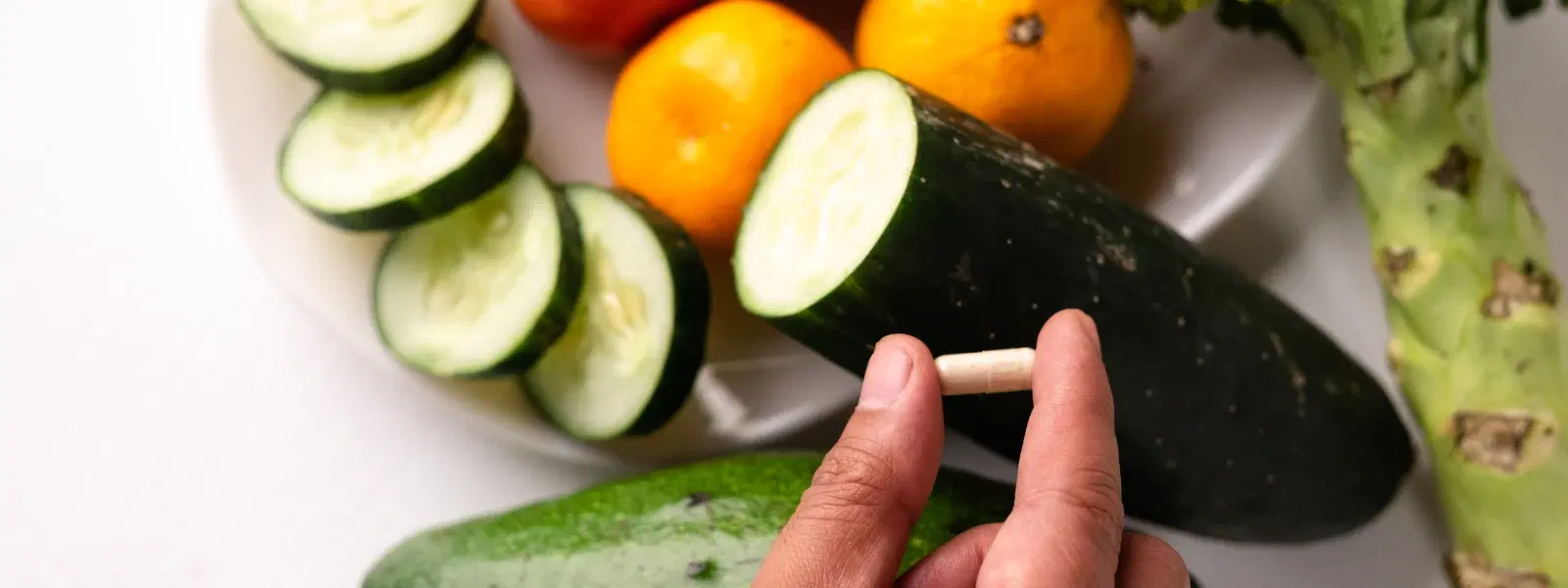
Beauty & Skincare
•04 min read
-9872eb55-9af0-4022-8644-bd8f05e8333e.png&w=3840&q=75)
When it comes to managing oily skin, nutrition is as important as your daily skincare routine. This blog explains how an oily skin diet can help reduce breakouts and control excess sebum. You will learn how specific foods for clear skin work to balance oil production and serve as a guide to creating a diet for acne-prone skin.
Your skin's oil production is linked to what you eat. A diet rich in nutrition for healthy skin can help balance sebum levels by providing essential vitamins and antioxidants. Foods for clear skin contain natural ingredients that soothe inflammation and help maintain an even complexion. Along with hormones and genetics, what you eat plays a key role in keeping your skin balanced. A diet that focuses on nutrients like omega-3 fatty acids, vitamins A, C, and E aids in reducing inflammation and controlling oil production.
Eating a skin-friendly diet is not just about avoiding breakouts; it is about embracing a lifestyle that celebrates health and style. Every meal can be a step towards achieving clearer skin, and integrating skincare tips for oily skin into your daily habits will multiply the benefits.
Incorporating the best foods for oily skin into your daily routine can offer a natural way to manage oiliness. Hydrating foods for oily skin such as cucumbers, watermelon, and citrus fruits help flush out toxins while keeping the skin refreshed. They also work in tandem with your skincare regimen by keeping the skin hydrated from within.
Nutrient-rich options can further support skin health. Leafy greens like spinach and kale are full of antioxidants that repair skin tissue, while fatty fish provide omega-3 fatty acids known to reduce inflammation and promote a balanced complexion. Nuts and seeds, which are rich in zinc, also play an important role by helping to regulate sebum production. Vitamins for oily skin, such as vitamin A from carrots and sweet potatoes, aid in controlling oil production, and vitamin C from oranges and strawberries supports collagen production, protecting the skin against free radicals.
Pro Tip: Balance Is Key
Did you know that a balanced diet not only improves your skin's appearance but also supports overall health? Aim for a mix of lean proteins, whole grains, and healthy fats to keep your skin glowing and oil-free.
It is just as important to know what to avoid as it is to know what to include in your oily skin diet. Certain foods may trigger sebum production and worsen acne. Dairy products are known to potentially increase hormone levels. Sugary foods and beverages cause insulin spikes that can trigger inflammation, while processed and fried foods often contain unhealthy fats that may contribute to a shiny complexion and clogged pores.
-5ba1f1f6-995b-4617-a1ff-43890351cff7.png&w=3840&q=75)
High-glycemic foods, such as white bread and pastries, spike insulin levels and can lead to an overactive oil gland. Likewise, salty foods may dehydrate the skin, prompting it to produce more oil to restore moisture balance. Steering clear of these items is key to managing skin health and achieving a clearer complexion.
Designing an anti-acne diet plan is a practical approach to managing oily skin. A sample skin-friendly diet could include breakfast with oatmeal topped with berries and chia seeds to start your day with a boost of hydration and antioxidants. For lunch, consider grilled salmon paired with quinoa and steamed broccoli, which offer a healthy dose of omega-3 fatty acids and vitamins for oily skin. A snack like a handful of almonds paired with a green smoothie provides nourishing zinc and healthy fats, while dinner might feature lentil soup with a mixed greens salad, supporting overall skin health.
For long-term success, remember these key points:
• Include a variety of colorful fruits and vegetables in your meals.
• Drink water consistently throughout the day.
• Limit processed foods and sugary snacks to avoid unnecessary oil triggers.
A well-planned oily skin diet should be paired with smart skincare tips for oily skin. Hydration and cleansing are essential steps; drinking enough water and using a gentle cleanser twice a day helps manage oil levels. Make sure to choose non-comedogenic products that are lightweight and do not clog pores, reinforcing the benefits of your nutrition plan and keeping your skin fresh.
Lifestyle habits also have a significant influence on skin clarity. Ensure you get a good night's sleep, ideally 7-8 hours, as this allows your skin to repair overnight. Incorporating regular exercise improves blood circulation and reduces stress, which is a known trigger for oil production. These adjustments can enhance your efforts toward achieving a balanced, clear complexion.
A diet rich in fruits, vegetables, whole grains, and lean proteins is best for oily skin. Emphasize hydrating foods, omega-3 fatty acids, and antioxidants to help manage oil production.

Foods high in sugar, dairy, and unhealthy fats can trigger increased oil production. These include sugary snacks, fried items, and processed meals.
While diet alone may not permanently remove oily skin, reducing high-glycemic foods and including anti-inflammatory options along with adequate hydration can greatly improve skin condition over time.
Yes, vitamins such as A, C, and E are helpful. They work to regulate sebum production, reduce inflammation, and guard the skin against free radicals.
Yes, consistently drinking water helps maintain skin hydration and balance, which prevents the skin from overproducing oil due to dehydration.
Managing oily skin begins with balancing your diet. Focusing on a skin-friendly diet filled with hydrating, anti-inflammatory, and nutrient-rich foods can lead to a clearer complexion. Combining these dietary choices with proper skincare routines such as regular cleansing and hydration helps maintain healthy skin. Your efforts in pairing nutrition with lifestyle choices go a long way in ensuring a balanced, radiant skin. Remember, each balanced meal is a step towards transforming both your skin and overall wellbeing.